大学英语四级听力技巧攻略
四级听力技巧和方法

四级听力技巧和方法四级听力是英语四级考试中的一项重要内容,对于很多学生来说是较难的一项。
下面给出一些四级听力的技巧和方法,帮助大家提高四级听力水平。
一、提前熟悉四级听力考试的形式了解四级听力考试的形式和题型对于备考很有帮助。
四级听力一般包括短对话、长对话和短文三个部分。
各部分的题型可能有多项选择、填空、判断等。
了解这些形式和题型,可以帮助你有针对性地进行听力练习和备考。
二、积极扩充英语词汇量四级听力中,涉及到的单词和词组非常多。
因此,在备考阶段,要积极扩充自己的英语词汇量。
可以通过背单词、看英语电影和电视剧、读英语书籍等方式来增加词汇量。
同时,在词汇量上积累了一定的基础后,可以有意识地去尝试去了解一些近义词和反义词,以备不时之需。
三、培养良好的听力习惯在备考期间,要培养良好的听力习惯。
可以多听一些英语电台、英语英文歌曲和英语短剧等,以提高自己的听力水平。
同时,还可以多做一些听力练习,可以选择一些四级听力模拟试题进行练习,并在做题后仔细听录音,找出自己的不足之处,以便加以弥补。
四、重视听力技巧的培养听力技巧对于提高四级听力水平非常重要。
以下是一些常用的听力技巧:1.遇到不认识的单词或词组时,不要慌张,可以根据上下文的意思进行猜测。
2.理解上下文,根据问句的意思,有条件地“预测”答案。
例如,提问的是一些地点的存在与否,可以在听到这个地点名字时特别注意。
3.注意听音频中的数字和日期,这些内容容易漏听或者听错。
4.注意听发音、声调和语调的变化,通常情况下是和“常规的”发音有所区别的。
5.注意识别上下文中的关键词,在有限的时间内迅速了解主题和要点。
五、做题顺序和时间分配在做四级听力考题时,可以采用先做短文题目,再做长对话题目,最后做短对话题目的方式。
这是因为短文题目往往对于理解文章整体内容和主题有帮助,长对话题目通常相对较难,而短对话题目较为简单。
同时,根据题目的分值进行时间分配,需要多花一些时间在分值较高的题目上,这样可以确保分数的稳定性。
如何听英语四级听力的技巧

如何听英语四级听力的技巧学好英语听力需要一些技巧和策略。
在这里,我将分享一些帮助你提高英语四级听力的技巧。
1.提前准备:在正式开始听力部分之前,先了解一下考试的内容和形式。
熟悉题型和听力材料的难度水平,可以让你更有信心地应对考试。
2.提高听力能力:日常生活中多听英语,可以通过听英语新闻、英语电台、英语歌曲等来提高听力能力。
同时,可以逐渐增加听力材料的难度,挑战自己的听力水平。
3.注意听力技巧:掌握一些常用的听力技巧,例如注意关键词、捕捉上下文暗示、注意细节等。
这些技巧可以帮助你更好地理解听力材料。
4.集中注意力:在听力考试中,集中注意力非常重要。
努力保持专注,避免分心。
如果你错过了一部分内容,不要放弃,继续关注后面的内容。
5.预测答案:在听力材料播放之前,可以先读一下问题,然后预测一下可能的答案。
这样,在听力材料播放时,你可以更有针对性地注意相关信息,更容易找到答案。
6.大意理解:在听力材料播放时,可以尝试抓住大意。
不要过于纠结每一个细节,而要从整体上理解材料的大意。
7.做笔记:在听力考试中,你可以用简洁的方式做一些关键词的笔记。
这样,可以帮助你更好地回忆和理解听力材料。
8.多练习:听力需要不断的练习和积累。
多做一些模拟题和练习题,加强自己的听力技巧和能力。
9.注意听力材料的口音和语速:英语有各种各样的口音,当你准备听英语四级考试时,你可以尝试听听来自不同国家的英语,如美国英语、英国英语和澳大利亚英语。
这样,你可以适应不同的口音和语速。
10.不要轻易放弃:在听力考试中,有时会遇到很难的问题,但是不要轻易放弃。
尽量尝试听到一些关键词或关键信息,猜测答案。
记住,每一次练习都有助于提高你的听力水平。
提高英语四级听力水平需要时间和努力。
按照上述技巧积极练习和准备,相信你会取得不错的成绩。
祝你好运!。
大学英语四级听力的技巧
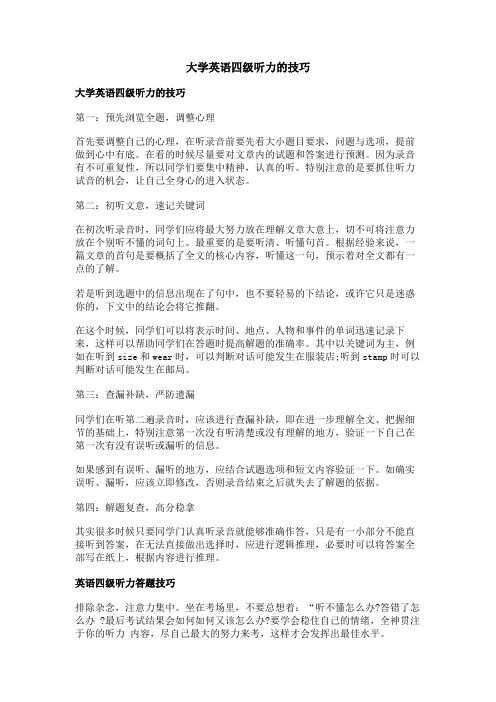
大学英语四级听力的技巧大学英语四级听力的技巧第一:预先浏览全题,调整心理首先要调整自己的心理,在听录音前要先看大小题目要求,问题与选项,提前做到心中有底。
在看的时候尽量要对文章内的试题和答案进行预测。
因为录音有不可重复性,所以同学们要集中精神,认真的听。
特别注意的是要抓住听力试音的机会,让自己全身心的进入状态。
第二:初听文意,速记关键词在初次听录音时,同学们应将最大努力放在理解文章大意上,切不可将注意力放在个别听不懂的词句上。
最重要的是要听清、听懂句首。
根据经验来说,一篇文章的首句是要概括了全文的核心内容,听懂这一句,预示着对全文都有一点的了解。
若是听到选题中的信息出现在了句中,也不要轻易的下结论,或许它只是迷惑你的,下文中的结论会将它推翻。
在这个时候,同学们可以将表示时间、地点、人物和事件的单词迅速记录下来,这样可以帮助同学们在答题时提高解题的准确率。
其中以关键词为主,例如在听到size和wear时,可以判断对话可能发生在服装店;听到stamp时可以判断对话可能发生在邮局。
第三:查漏补缺,严防遗漏同学们在听第二遍录音时,应该进行查漏补缺,即在进一步理解全文、把握细节的基础上,特别注意第一次没有听清楚或没有理解的地方,验证一下自己在第一次有没有误听或漏听的信息。
如果感到有误听、漏听的地方,应结合试题选项和短文内容验证一下。
如确实误听、漏听,应该立即修改,否则录音结束之后就失去了解题的依据。
第四:解题复查,高分稳拿其实很多时候只要同学门认真听录音就能够准确作答,只是有一小部分不能直接听到答案,在无法直接做出选择时,应进行逻辑推理,必要时可以将答案全部写在纸上,根据内容进行推理。
英语四级听力答题技巧排除杂念,注意力集中。
坐在考场里,不要总想着:“听不懂怎么办?答错了怎么办 ?最后考试结果会如何如何又该怎么办?要学会稳住自己的情绪,全神贯注于你的听力内容,尽自己最大的努力来考,这样才会发挥出最佳水平。
大学英语四级考试听力技巧
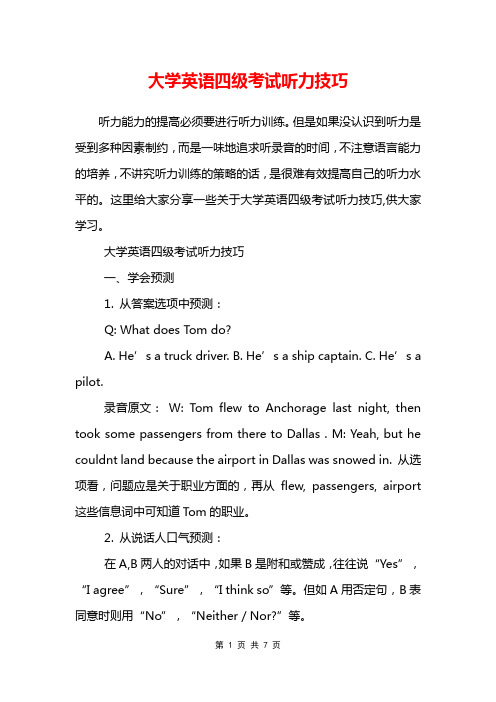
大学英语四级考试听力技巧听力能力的提高必须要进行听力训练。
但是如果没认识到听力是受到多种因素制约,而是一味地追求听录音的时间,不注意语言能力的培养,不讲究听力训练的策略的话,是很难有效提高自己的听力水平的。
这里给大家分享一些关于大学英语四级考试听力技巧,供大家学习。
大学英语四级考试听力技巧一、学会预测1. 从答案选项中预测:Q: What does Tom do?A. He’s a truck driver.B. He’s a ship captain.C. He’s a pilot.录音原文:W: Tom flew to Anchorage last night, then took some passengers from there to Dallas . M: Yeah, but he couldnt land because the airport in Dallas was snowed in. 从选项看,问题应是关于职业方面的,再从flew, passengers, airport 这些信息词中可知道Tom的职业。
2. 从说话人口气预测:在A,B两人的对话中,如果B是附和或赞成,往往说“Yes”,“I agree”,“Sure”,“I think so”等。
但如A用否定句,B表同意时则用“No”,“Neither / Nor?”等。
例如:A: Harvey doesnt seem to fit into this class. B: No, he is really a fish out of water.二、做简要笔记例:How much will the man pay for the tickets?A.$18B. $24C. $30原文:W: Tickets for the movie are $ 6 for adults, half price for children. M: All right, I’d like three tickets for adults and two tickets for children, please. 笔记可简化为:$ 6 AA代表adult,C代表children,3A+2C或6 A3+ half C2三、听清数据在获取时间信息时,不要误把会话中提到的时间简单确定为问题的答案。
四级考试听力技巧
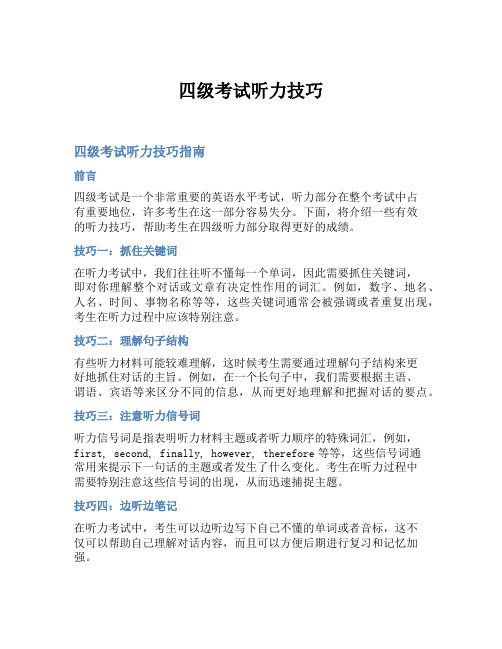
四级考试听力技巧四级考试听力技巧指南前言四级考试是一个非常重要的英语水平考试,听力部分在整个考试中占有重要地位,许多考生在这一部分容易失分。
下面,将介绍一些有效的听力技巧,帮助考生在四级听力部分取得更好的成绩。
技巧一:抓住关键词在听力考试中,我们往往听不懂每一个单词,因此需要抓住关键词,即对你理解整个对话或文章有决定性作用的词汇。
例如,数字、地名、人名、时间、事物名称等等,这些关键词通常会被强调或者重复出现,考生在听力过程中应该特别注意。
技巧二:理解句子结构有些听力材料可能较难理解,这时候考生需要通过理解句子结构来更好地抓住对话的主旨。
例如,在一个长句子中,我们需要根据主语、谓语、宾语等来区分不同的信息,从而更好地理解和把握对话的要点。
技巧三:注意听力信号词听力信号词是指表明听力材料主题或者听力顺序的特殊词汇,例如,first, second, finally, however, therefore等等,这些信号词通常用来提示下一句话的主题或者发生了什么变化。
考生在听力过程中需要特别注意这些信号词的出现,从而迅速捕捉主题。
技巧四:边听边笔记在听力考试中,考生可以边听边写下自己不懂的单词或者音标,这不仅可以帮助自己理解对话内容,而且可以方便后期进行复习和记忆加强。
技巧五:多练习最后一个技巧就是多练习了。
只有通过不断地练习,我们才能更好地掌握听力技巧并且逐渐提高我们的英语水平。
可以通过听力练习软件、听力材料集锦或者辅导班等方式进行练习。
结语以上就是四级考试中听力部分的技巧指南,希望考生可以在考试中顺利发挥并且取得好成绩。
提醒一下,除了听力部分,多听英语歌、看英语电影、阅读英文文章等外,对于四级整体水平也会有很大帮助。
注意事项除了以上的技巧,考生在考试过程中还需要注意一些事项,这些事项可能会影响考试成绩。
以下是一些值得注意的事项:1.注意听力材料开始前和结束后的提示语,这些提示语可能会包含重要的考试指导和注意事项。
英语四级听力技巧和方法
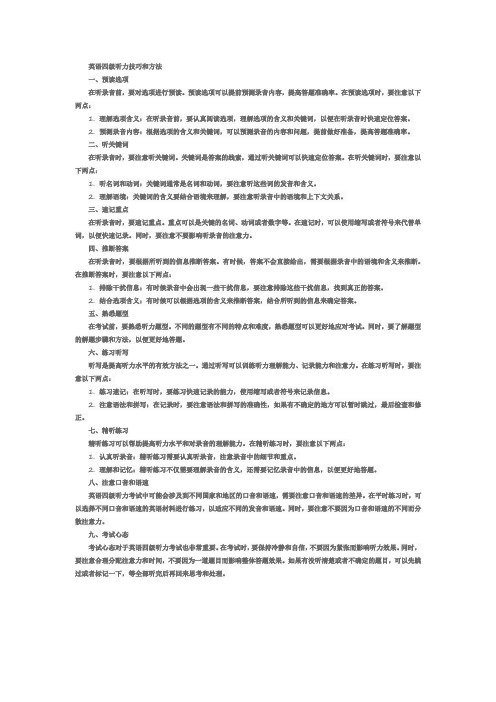
英语四级听力技巧和方法一、预读选项在听录音前,要对选项进行预读。
预读选项可以提前预测录音内容,提高答题准确率。
在预读选项时,要注意以下两点:1. 理解选项含义:在听录音前,要认真阅读选项,理解选项的含义和关键词,以便在听录音时快速定位答案。
2. 预测录音内容:根据选项的含义和关键词,可以预测录音的内容和问题,提前做好准备,提高答题准确率。
二、听关键词在听录音时,要注意听关键词。
关键词是答案的线索,通过听关键词可以快速定位答案。
在听关键词时,要注意以下两点:1. 听名词和动词:关键词通常是名词和动词,要注意听这些词的发音和含义。
2. 理解语境:关键词的含义要结合语境来理解,要注意听录音中的语境和上下文关系。
三、速记重点在听录音时,要速记重点。
重点可以是关键的名词、动词或者数字等。
在速记时,可以使用缩写或者符号来代替单词,以便快速记录。
同时,要注意不要影响听录音的注意力。
四、推断答案在听录音时,要根据所听到的信息推断答案。
有时候,答案不会直接给出,需要根据录音中的语境和含义来推断。
在推断答案时,要注意以下两点:1. 排除干扰信息:有时候录音中会出现一些干扰信息,要注意排除这些干扰信息,找到真正的答案。
2. 结合选项含义:有时候可以根据选项的含义来推断答案,结合所听到的信息来确定答案。
五、熟悉题型在考试前,要熟悉听力题型。
不同的题型有不同的特点和难度,熟悉题型可以更好地应对考试。
同时,要了解题型的解题步骤和方法,以便更好地答题。
六、练习听写听写是提高听力水平的有效方法之一。
通过听写可以训练听力理解能力、记录能力和注意力。
在练习听写时,要注意以下两点:1. 练习速记:在听写时,要练习快速记录的能力,使用缩写或者符号来记录信息。
2. 注意语法和拼写:在记录时,要注意语法和拼写的准确性,如果有不确定的地方可以暂时跳过,最后检查和修正。
七、精听练习精听练习可以帮助提高听力水平和对录音的理解能力。
在精听练习时,要注意以下两点:1. 认真听录音:精听练习需要认真听录音,注意录音中的细节和重点。
四级听力做题技巧
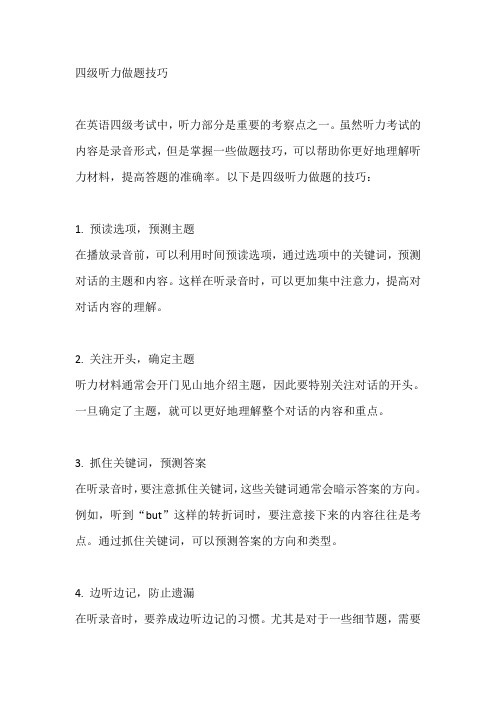
四级听力做题技巧在英语四级考试中,听力部分是重要的考察点之一。
虽然听力考试的内容是录音形式,但是掌握一些做题技巧,可以帮助你更好地理解听力材料,提高答题的准确率。
以下是四级听力做题的技巧:1. 预读选项,预测主题在播放录音前,可以利用时间预读选项,通过选项中的关键词,预测对话的主题和内容。
这样在听录音时,可以更加集中注意力,提高对对话内容的理解。
2. 关注开头,确定主题听力材料通常会开门见山地介绍主题,因此要特别关注对话的开头。
一旦确定了主题,就可以更好地理解整个对话的内容和重点。
3. 抓住关键词,预测答案在听录音时,要注意抓住关键词,这些关键词通常会暗示答案的方向。
例如,听到“but”这样的转折词时,要注意接下来的内容往往是考点。
通过抓住关键词,可以预测答案的方向和类型。
4. 边听边记,防止遗漏在听录音时,要养成边听边记的习惯。
尤其是对于一些细节题,需要在听懂的基础上记录相关信息。
可以使用缩写、符号等方式快速记录关键信息,这样可以更好地回忆对话内容,提高答题的准确性。
5. 识别语音变化,判断答案有时候听力材料中会出现一些语音变化,如语速加快、语调升高或降低等。
这些变化通常会暗示答案的出现,因此要学会识别这些变化,及时做好标记。
6. 理解对话逻辑,预测答案听力材料中的对话逻辑也是很重要的。
通过理解对话的逻辑关系,可以预测接下来会出现的内容和答案。
例如,在讨论中出现了反对意见,接下来往往会引出支持意见或者提出新的观点。
掌握对话逻辑可以帮助你更好地把握答案的出现位置。
7. 识别语音中的提示词,辅助解题听力材料中往往会包含一些提示词,这些提示词可以帮助你预测答案。
例如,“which of the following is not mentioned?”这样的提示词会告诉你答案中有一个选项没有被提到。
通过识别这些提示词,可以更快地找到答案的位置。
总之,在做四级听力题时,要学会运用各种技巧来提高答题的准确率。
英语四级考试听力答题技巧总结
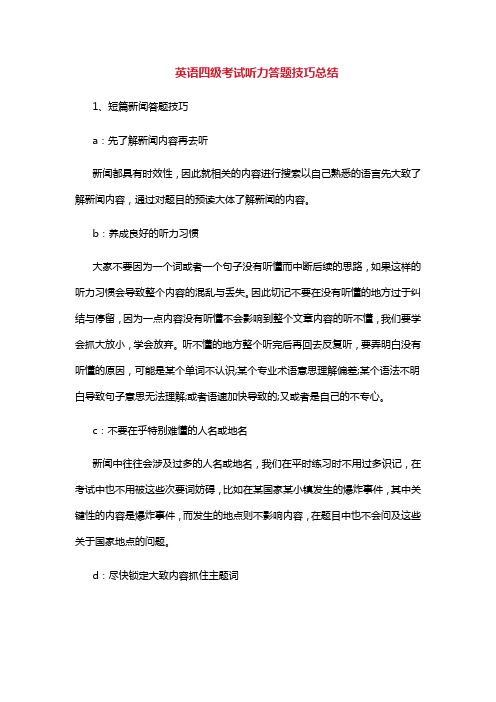
英语四级考试听力答题技巧总结1、短篇新闻答题技巧a:先了解新闻内容再去听新闻都具有时效性,因此就相关的内容进行搜索以自己熟悉的语言先大致了解新闻内容,通过对题目的预读大体了解新闻的内容。
b:养成良好的听力习惯大家不要因为一个词或者一个句子没有听懂而中断后续的思路,如果这样的听力习惯会导致整个内容的混乱与丢失。
因此切记不要在没有听懂的地方过于纠结与停留,因为一点内容没有听懂不会影响到整个文章内容的听不懂,我们要学会抓大放小,学会放弃。
听不懂的地方整个听完后再回去反复听,要弄明白没有听懂的原因,可能是某个单词不认识;某个专业术语意思理解偏差;某个语法不明白导致句子意思无法理解;或者语速加快导致的;又或者是自己的不专心。
c:不要在乎特别难懂的人名或地名新闻中往往会涉及过多的人名或地名,我们在平时练习时不用过多识记,在考试中也不用被这些次要词妨碍,比如在某国家某小镇发生的爆炸事件,其中关键性的内容是爆炸事件,而发生的地点则不影响内容,在题目中也不会问及这些关于国家地点的问题。
d:尽快锁定大致内容抓住主题词新闻的主旨往往在首句处,因此前边内容要认真听清楚,往往一句话概括出内容,后边都是细节介绍。
所以要尽快地抓住文章主旨。
主旨句往往含有内容关键词,比如bus explosion/US election race等等。
当然也会有Now in sp orts(现在进入体育新闻)....../Turn to the Middle East(现在转向中东地区)......等简单的呈现方式。
2、长对话的答题技巧两个长对话,长对话的答案一般也是从上面短对话的几个方面去考虑得出答案。
要注意的是,有时候同一个长对话里的不同问题,答案可能从不同的方面得出。
做这部分试题的时候,要注意以下几点:听音前,预读选项尽可能地把3或者4道试题的选项浏览一遍,根据选项猜测可能出现的问题及提问方式。
听音时,迅速抓住与选项及所猜测问题有关的关键词,速记有关内容或者在选项后面做记号,在有可能成为答案的选项后面做记号,在绝对没有可能成为答案的选项后面做记号,当然两种记号肯定应该不一样。
- 1、下载文档前请自行甄别文档内容的完整性,平台不提供额外的编辑、内容补充、找答案等附加服务。
- 2、"仅部分预览"的文档,不可在线预览部分如存在完整性等问题,可反馈申请退款(可完整预览的文档不适用该条件!)。
- 3、如文档侵犯您的权益,请联系客服反馈,我们会尽快为您处理(人工客服工作时间:9:00-18:30)。
外教一对一大学英语四级听力技巧攻略技巧攻略概论一、大纲要求听力理解部分测试学生获取口头信息的能力。
录音材料用标准的英式或美式英语朗读,语速约为每分钟130词。
听力部分分值比例为35%,其中短篇新闻占7%,长对话占8%,听力篇章占20%。
考试时间25分钟。
听力理解部分考查学生获取口头信息的能力,包括理解主旨大意、重要事实和细节、隐含意义,判断话语的交际功能、说话人的观点、态度等。
听力理解部分考核的技能是:A 理解中心思想和重要细节1)理解中心思想2)听懂重要的或特定的细节3)判断说话人的观点、态度等B 理解隐含的意思4)推论隐含的意义5)判断话语的交际功能C 借助语言特征理解听力材料6)辨别语音特征,如从连续的话语中辨别语音、理解重音和语音语调等7)理解句间关系,如比较、原因、结果、程度、目的等大学英语四级考试听力理解部分要求考生达到《教学要求》中的一般要求,即“能听懂英语授课,能听懂日常英语谈话和一般性题材讲座,能基本听懂慢速英语节目,语速为每分钟130词左右,能掌握其中心大意,抓住要点。
能运用基本的听力技巧帮助理解。
”二、评分标准从2006年6月起,记分体制发生了变化,考试成绩改为了标准分,即分布在290~710分之间,具体是正态分,均值500分,一个标准差为70分,最低成绩为290分,最高成绩为710分。
不设及格分数线,成绩报道的方式由考试合格证书改为成绩报告单,即考后向总分在220分以上(含220分)的考生发放成绩报告单。
凡总分在220分以下者(包括缺考者和作弊违纪者),其单项分和总分计为0分,不发成绩报告单。
外教一对一 新题型,新记分方法改革后各题型所占分值比例分别为:听力(35%)、阅读(35%)、写作(15%)和翻译(15%)。
第二节技能必备听力理解是一种接受性技能,也是一个复杂、积极、多层次的思维过程。
它是诸多语言技能的综合运用,涉及语音、语调、词汇、句型、句法、语言和非语言等诸多方面的知识。
因此,要做好听力理解,必须具备以下一些基本技能。
一、掌握语音知识语音对听力理解起着至关重要的作用,掌握正确的语音是听力理解的基础。
语音因素是指考生的听觉对英语语音的敏锐度。
这包括考生自己的发音,以及考生对于不同的英语口音,特别是美式英语和英式英语的区分。
要注意区分和模仿正确的语音和语调。
语音的改进对听力成绩的提高也大有裨益。
很多考生虽然单词量很大,但就是听不懂自己认识的单词,甚至很简单的单词都听不懂。
原因大致有两点:1. 自己的发音不标准,平时都是按自己不标准的发音记单词,在标准发音的听力考试中,当然辨别不出来。
2. 不熟悉英语的发音习惯,包括英语的发音规则,如连读、失爆、清辅音浊化等现象,以及英语语调与汉语语调的区别等。
事实上,平时练听力时出现的“听不懂”现象,很重要的原因是分辨不出自己熟悉的单词,以及单词与单词之间的界限。
如果说阅读是凭借字母的组合形式去判断词义的话,那么听力则主要依靠声音确定词的意思。
下面列出了英语音标表,供考生参考学习。
本书还在附录中提供了听力语音表,希望对考生有所帮助。
1. 辨音辨音,即辨别单词中出现的相似音素。
英语中,由于音素相近或说话者的发音习惯会导致混音,使听者分辨不清,造成误解,所以辨音能力的高低是考生听力基本功强弱的直接表现,也是考生突破听力理解的重要一关。
一些易混的音如下:1. 长音和短音,如:[u:]—[u],[ɔ:]—[ɔ],[i:]—[i],[ə:]—[ə],[ɑ:]—[ʌ]。
2. 清辅音和浊辅音,如:[p]—[b],[k]—[g],[t]—[d],[f]—[v],[s]—[z]。
3. 部分区域的人特有的障碍,如:[n]—[l]—[ŋ],[h]—[f],[r]—[l]。
4. 两个单词或词组发音相同,但词形、词义不同,如:our与hour。
5. 两个单词或词组发音、词形相近,但词义不同,如:horse与house。
6. 两个单词或词组发音相近,词形、词义相近,如:stock与stalk,读音分别为[stɔk]与[stɔ:k],stock是“树干”的意思,stalk 是“茎,秆”的意思。
外教一对一 四级听力对辨音的考查主要利用单词或词组之间音、形、义的相似或不同,结合一定的语境,用读音中的一些细微变化设置各种不同的干扰项来迷惑考生,所以考生应:1. “一锤定音”。
相信自己所听到的音,不要被选项迷惑,同时注意联系语境。
2. 平时一定要注意自己的发音。
3. 系统、集中地掌握一些发音相同、相近的单词。
2. 失爆失爆即爆破音的失去。
如有两个爆破音或同一爆破音([p],[b],[t],[d],[k],[g])连贯出现在同一单词中或连贯出现在前一单词尾与后一单词首,前一音只按其发音部位形成阻碍,但不爆破,稍作间歇后立即过渡到后一个音的发音部位并爆破,这种现象称为失爆。
失爆在四级听力考试中较为常见,这就导致了很多考生在答题时误听或漏听。
失爆通常有以下几种情况:1. 爆破音相遇要失爆,如:doc tor[ˋdɔktə]医生→[ˋdɔtə],与daughter[ˋdɔ:tə]女儿的读音相近obtain[əbˋtein]获得→[əˋtein],与attain[əˋtein]获得的读音相同a flat tire[əˋflætˋtaiə]瘪了的车胎→[əˋflæˋtaiə]a good time[əˋgudˋtaim]玩得好→[əˋguˋtaim]a big cake[əˋbigˋkeik]大蛋糕→[əˋbiˋkeik]2. 爆破音在[f]、[ϑ]、[s]、[ʃ]、[h]、[v]、[ð]、[z]、[ʒ]、[r]前要失爆,如:absent[ˋæbsənt]缺席的→[ˋæsənt]eighth[eitϑ]第八→[eiϑ]a black shirt[əˋblækˋʃə:t]黑衬衣→[əˋblæˋʃə:t]best friend[ˋbestˋfrend]最好的朋友→[ˋbesˋfrend]like this[laikˋðis]像这样→[laiˋðis]3. 爆破音在[tʃ]、[tr]、[ts]、[dʒ]、[dr]、[dz]前要失爆,如:picture[ˋpiktʃə]图画→[ˋpitʃə]外教一对一 object[ˋɔbdʒikt]对象→[ˋɔdʒikt]a white jacket[əˋwaitˋdʒækit]白夹克→[əˋwaiˋdʒækit]a good chance[əˋgudˋtʃɑ:ns]好机会→[əˋguˋtʃɑ:ns]odd jobs[ˋɔdˋdʒɔbz]杂活→[ˋɔˋdʒɔbz],与all jobs[ˋɔ:lˋdʒɔbz]所有工作读音相近4. 爆破音在[l]前要失爆,如:little[ˋl itl]小的→[ˋlil]hard life[ˋhɑ:dˋlaif]艰苦的生活→[ˋhɑ:ˋlaif]5. 爆破音在[m]、[n]、[r]前要失爆,如:garden[ˋgɑ:dn]花园→[ˋgɑ:n]lightning[ˋlaitniŋ]闪电→[ˋlainiŋ]good morning[ˋgudˋmɔ:niŋ]早上好→[ˋguˋmɔ:niŋ]let me[ˋlet mi]让我→[ˋlemi]失爆现象虽然看起来规则很多,其实可以简单理解为“爆破音在大多数辅音前不发音”。
2. 连读连读,指两个或多个属于不同单词的音素因语音规则、位置相邻或语速较快等原因连在一起读的现象,它同失爆一样,也是口语中经常出现的音变现象。
连读通常有以下几种情况:1. 如果前一个词以辅音结尾,后一个词以元音开头,这两个词通常连着发音,这是连读最基本的情况。
如:worn out连读后变成[w ɔ:ˋnaut],rush hour连读后变成[rʌˋʃauə]。
2. 元音与元音也可以连读。
如:go out连读后应该是[gaut],而不是[gəuˋaut];I am, you are, she is分别连读为[aim],[ju:ˋɑ:],[ˋʃi:z]。
3. 在有些情况下,辅音与辅音也可以连读。
如:would you的读音是[wuˋdʒu:],而不是[wuˋdju:]。
注意:there be句型中的there is, there are经常在口语中连读为[ðɛəˋriz],[ðɛəˋrɑ:]。
在四级听力考试中,连读现象较为频繁地出现在词组和习语中。
外教一对一4. 语调和语气语调可用来表示谈话者对事件的态度、感情、口吻和意图等。
学生要培养从所听到的只言片语中抓住说话者态度的能力,这也是四级听力考试的考点之一。
语调是英语的一种重要语音现象,不同的语调表达不同的感受和态度。
一般降调表示肯定、夸奖,如:I am a good student. ↘I passed the exam. 说明自己是好学生;升调表示怀疑、责备、否定,如:I am a good student? ↗I failed the exam three times. 责备自己不是一个好学生。
四级听力中的语调通常有以下几种情况:1. 用降调表示赞同、夸奖。
I am a good student. ↘I passed the exam.2. 用降调表示抱怨。
Terrible. ↘It seems like the more the professor talks, the less I understand.3. 用升调表示否定、疑问或强调。
I am a good student? ↗I failed the exam three times.二、了解相关数字表达数字涉及的内容主要有:时间、年代、日期、年龄、电话号码、价格、数量、房号、尺寸、大小等。
数字的读法非常重要,会读,才会听。
下面就四级听力中常遇到的数字表达做简单介绍。
1. 时间的表达(1)时刻的读法5:15读作 a quarter past / after five或five fifteen2:45读作 a quarter to three或two forty-five7:30读作 half past seven或seven thirty9:10读作 ten past nine或nine ten8:00读作 eight (o'clock) / eight (o'clock) sharp14:00读作 two p.m.或fourteen hundred hours00:25读作 twenty-five past / after midnight(2)年、月、日的读法1998年5月7日:May (the) seventh nineteen ninety-eight2003年:two thousand and three外教一对一公元前1086年:one thousand and eighty-six B.C.前天:the day before yesterday后天:the day after tomorrow每隔一天:every other day或every two days下星期这个时候:this time next week两星期:a fortnight10年:a decade100年:a century一般来说,正确答案不会是直接听到的时间,往往是在意思上与之相同或相近,或换了一种方式表达,或要求在听到的时间信息基础上进行简单的运算。
